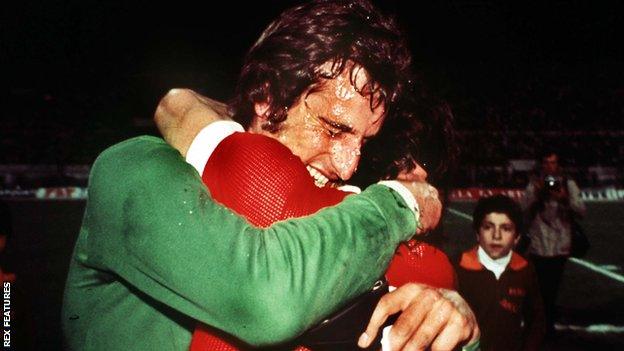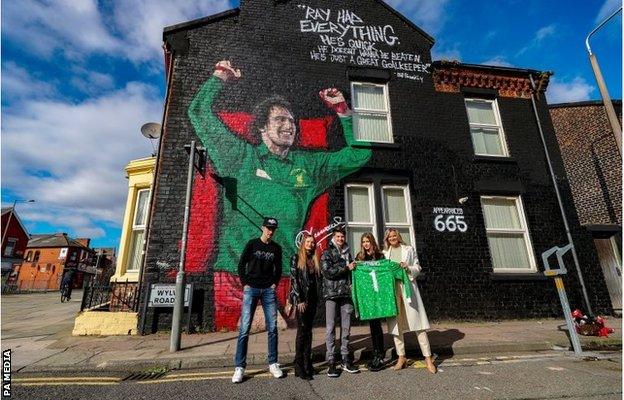Ray Clemence: Former England, Liverpool and Tottenham goalkeeper was 'one of the world's best'
- Published
- comments

Ray Clemence won five league titles and three European Cups with Liverpool between 1967 and 1981
Ray Clemence, who has died at the age of 72, was quite simply one of the greatest goalkeepers of the post-war generation, with a glittering record of success at Liverpool and Tottenham Hotspur that stands as a monument to his talent.
Skegness-born Clemence was a key component of great Liverpool sides under Bill Shankly and Bob Paisley in the 1970s and early '80s that swept all before them at home and abroad, before he left Anfield to enjoy more success at White Hart Lane.
And even though Clemence won an impressive 61 England caps in an 11-year international career, that tally could have been much higher but for the presence of Peter Shilton as a rival, with one manager Ron Greenwood often unable to decide between the pair, preferring a policy of alternation that actually disguised indecision.
Clemence pursued a managerial career at Barnet and was also part of the coaching team at Spurs before becoming a vital member of England's backroom staff - but it was as a magnificently agile, reliable and highly decorated goalkeeper that he will secure his place in history, and for which he will be forever remembered.
The young Clemence was spotted by Liverpool manager Shankly playing for Scunthorpe United - as was his future Liverpool and England team-mate Kevin Keegan - and was signed in an £18,000 deal in June 1967.
Clemence was initially understudy to the veteran Tommy Lawrence but became first choice after Shankly decided on a changing of the great old guard of Anfield after a calamitous FA Cup quarter-final defeat at Watford, who were then struggling near the foot of the old Second Division, in February 1970.
It was the start of a career that ensured Clemence is currently regarded as Liverpool's finest ever goalkeeper, his greatness emphasised by both honours and longevity.
The seeds of the second great Liverpool side built by Shankly were sown immediately after the Scot's decision to dismantle the hugely successful '60s team, and the first signs of what was to come were seen as they reached the 1971 FA Cup final, only to lose to Double winners Arsenal.
Liverpool put matters right in years to come with Clemence as the peerless last line of defence, possessing the priceless quality of overcoming long periods of inactivity by retaining his concentration to make the vital match-winning save on numerous occasions.
Shankly's side won the title and Uefa Cup in 1972-73, a feat they repeated in 1975-76, victories in Europe coming over Borussia Monchengladbach and Club Bruges - two teams who would play an even more significant and glorious part in Clemence and Liverpool's story later in the decade.
The FA Cup was sealed with a comprehensive 3-0 win over Newcastle United in 1974 before the great prize, Liverpool's Holy Grail, was finally claimed in 1977 with the 3-1 European Cup final victory over Borussia Monchengladbach in Rome.
In that historic season, Liverpool had won the title once more but then lost the FA Cup final to Manchester United the Saturday before the European Cup final. Clemence's lifting of the spirits by leading a boisterously defiant sing-song immediately after that Wembley loss played a massive part in demonstrating his qualities of leadership and optimism.
Clemence was often more enthusiastic about playing out of goal than in his accustomed position in training at Melwood, revelling in his role as a makeshift physical striker shaking up his team-mates in those sessions, but he was a perfectionist when it came to the serious business and Shankly, with typical bluntness, insisted he was the best in the world and would brook no argument contradicting that view.
He won two more European Cups, against Club Bruges in 1978 at Wembley and Real Madrid in Paris in 1981, before shocking Liverpool and their supporters by deciding to leave to join Spurs weeks after that triumph.
The personal trophy tally when he left Liverpool was five titles, three European Cups, two Uefa Cups, the FA Cup and the League Cup over 665 first-team appearances.
In the first season after cutting those long-established Anfield ties, Clemence was on the receiving end of the successes he had previously enjoyed at Liverpool, beaten by his former club in the League Cup final. He did, though, receive a famously rapturous reception from his adoring Kop, captured by the Match of the Day cameras, when he returned for the first time in May 1982.

A mural of Ray Clemence was unveiled near Anfield last month with family members in attendance
Liverpool's 3-1 win on that emotional day confirmed another title but this time the player who had enjoyed all the old glories was an outsider looking in as Bruce Grobbelaar, who had been signed in 1981 to provide competition for Clemence, had assumed his former position in goal.
The Tottenham number one did not have long to wait for another celebration of his own, as a member of the side who won the FA Cup ten days later, victorious in a replay against Queen's Park Rangers at Wembley.
The title escaped a fine Spurs side but there was further glory as they won the 1983-84 Uefa Cup on penalties against Anderlecht, Clemence on the bench after an injury as Tony Parks saved the match-winning penalty at White Hart Lane.
Clemence was in goal for the dramatic 1987 FA Cup final which Spurs lost 3-2 to Coventry City, before an Achilles tendon injury sustained at Norwich City later that year effectively ended his career.
He was rightly considered to be in the bracket of the world's finest goalkeepers for the large part of his time at the top, but his England career, which started in a World Cup qualifier against Wales in November 1972, ran parallel with Shilton - a contemporary of equal stature.
It also coincided with England failing to qualify for successive World Cups in 1974 and 1978. When the 1982 World Cup came manager Greenwood, finally forced into a choice after years of indecision - even alternating at the 1980 European Championship in Italy - plumped for Shilton, leaving Clemence as an unused substitute.
He made his final international appearance in November 1983 in Luxembourg at the age of 35. He captained England in a friendly against Brazil in May 1981, the first keeper to lead out his country since Frank Swift in the 1940s.
Clemence spent several years on the Spurs coaching staff after retiring, working alongside his former Liverpool team-mate Doug Livermore with the first team, and also had a spell at Barnet as manager.
In the latter years of his career, he was a familiar, popular and influential figure around the England set-up as a coach, and specialist goalkeeping coach, over a number of years under managers Glenn Hoddle, Kevin Keegan, Sven-Goran Eriksson, Steve McClaren, Fabio Capello and Roy Hodgson.
Clemence, who was awarded the MBE for services to football in 1987, was hugely respected by England's managers and players for his expertise and calm advice as well as his own stellar career, retiring in 2013.
He will be remembered as one of the most significant figures in the history of Liverpool Football Club, as well as for an enduring career that also saw him play and work with great distinction for Spurs and England.